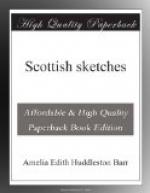Tallisker said, “Give him his way a little longer, laird. To bring him hame now is no use. People canna thole blue skies for ever; he’ll be wanting the moors and the misty corries and the gray clouds erelong.” So Colin had another year granted him, and his father added thousand to thousand, and said to his heart wearily many and many a time, “It is all vexation of spirit.”
At the end of the second year Crawford wrote a most important letter to his son. There was an opening for the family that might never come again. All arrangements had been made for Colin to enter the coming contest for a seat in Parliament. The Marquis of B—— had been spoken to, and Crawford and he had come to an understanding Crawford did not give the particulars of the “understanding,” but he told Colin that his “political career was assured.” He himself would take care of the works. Political life was open to his son, and if money and influence could put him in the House of Peers, money should not be spared.
The offer was so stupendous, the future it looked forward to so great, Crawford never doubted Colin’s proud, acquiescence. That much he owed to a long line of glorious ancestors; it was one of the obligations of noble birth; he would not dare to, neglect it.
Impatiently he waited Colin’s answer. Indeed, he felt sure Colin would answer such a call in person. He was disappointed when a letter came; he had not known, till then, how sure he had felt of seeing his son. And the letter was a simple blow to him. Very respectfully, but very firmly, the proposition was declined. Colin said he knew little of parties and cabals, and was certain, at least, that nothing could induce him to serve under the Marquis of B——. He could not see his obligations to the dead Crawfords as his father did. He considered his life his own. It had come to him with certain tastes, which he meant to improve and gratify, for only in that way was life of any value to him.
The laird laid the letter in Tallisker’s hands without a word. He was almost broken-hearted. He had not yet got to that point where money-making for money’s sake was enough. Family aggrandizement and political ambition are not the loftiest motives of a man’s life, but still they lift money-making a little above the dirty drudgery of mere accumulation. Hitherto Crawford had worked for an object, and the object, at least in his own eyes, had dignified the labor.
In his secret heart he was angry at Colin’s calm respectability. A spendthrift prodigal, wasting his substance in riotous living, would have been easier to manage than this young man of aesthetic tastes, whose greatest extravagance was a statuette or a picture. Tallisker, too, was more uneasy than he would confess. He had hoped that Colin would answer his father’s summons, because he believed now that the life he was leading was unmanning him. The poetical element in his character was usurping an undue mastery. He wrote to Colin very sternly, and told him plainly that a poetic pantheism was not a whit less sinful than the most vulgar infidelity.




